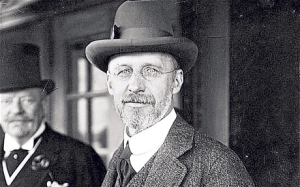by Richard van Pelt, WWI Correspondent
The front page of the Capital Journal reported fears of terrorism:
WIDE-SPREAD PLOT TO CREATE TERROR
Secret Service Agents Working On Theory That Pro-American Campaign Is On
Washington, July 13. – It was authoritatively admitted today that secret service agents suspect a widespread anti-allies terrorist plot in the east, but sufficient progress has not been made to establish proof or its existence in recent acts of violence and the discovery of bombs upon numerous ships en-route to England and France.

Sir Cecil Spring-Rice, the very popular British Ambassador at Washington
That the plot included an attempt to kill or kidnap Sir Cecil Spring-Rice, the British ambassador, as he came from the Morgan home Monday night, could not be verified today. It was denied that the ambassador was being especially guarded, but it is known that secret service agents and police are unostentatiously watching the British embassy. As a result of the threatening letter received in New Orleans Sunday night, more extensive precautionary measures are possibly now being observed.
There is no attempt to shroud reports of bombs having been found on trans-Atlantic ships in mystery. More attempts to blow up vessels carrying supplies to the allies have been made than have been made public, it was declared today. Most of the bomb-planting attempts have been frustrated. But authorities pointed out today that a while individual cranks might succeed in planting bombs aboard one or two ships, the great number than have been found suggests a master mind directing a widespread plot. And the theory that Frank Holt, who planted a bomb in the capitol and shot J.P. Morgan twice may have been a tool to such a conspiracy is being considered.
Reports that sensational disclosures may be expected soon could not be confirmed today, but they are persistent.
An editorial in the Capital Journal, “Troubles In Neutrality” addressed the difficulty neutrality holds for a major industrial power on the sidelines of this war:
TROUBLES IN NEUTRALITY
Neutrality is a hard row to hoe. Taking active part in war seems to require not much discretion or much principle, but keeping out of it calls for both in eminent degree.
The worst of it is that the more strictly neutral we remain, the more displeased with us are both our english and our German friends in this country.
Between the complaints of the Anglo-Americans and the German-Americans – the real dyed-in-the-wool Americans – find little peace, although neutral.
The Anglo-Americans insist on something more helpful than mere sympathy, something more partial than neutrality; they think we ought to have protested against the violation of Belgium’s neutrality, against the destruction of precious monuments of architectural or sacred interest to the whole world, against the laying of mines and against various other acts of Teutonic allies. If these wishes, well intended, were granted, we should soon be in war up to our ears.
On the other hand the National German-Americans League has clearly indicated its purpose to make the European war questions the main political issues in this country, the German-Americans proposing to stand together in our elections.
It is easy to carry this sort of thing too far, and the pro-German propaganda is certainly going too far. The American public is tolerant in politics to the extreme, but one thing it never would and never will stand for is coercion by alien influences and interests.






